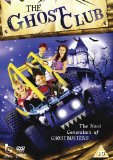 Ghost Club | DVD | (28/04/2008)
from £N/A
| Saving you £N/A (N/A%)
| RRP
Ghost Club | DVD | (28/04/2008)
from £N/A
| Saving you £N/A (N/A%)
| RRP Ghost Club
![Cosi Fan Tutte - Mozart [1984]](/pictures/1037660.jpg) Cosi Fan Tutte - Mozart | DVD | (02/05/2006)
from £6.55
| Saving you £14.70 (277.88%)
| RRP
Cosi Fan Tutte - Mozart | DVD | (02/05/2006)
from £6.55
| Saving you £14.70 (277.88%)
| RRP From his initial appointing as Drottningholm's Artistic Director Arnold Ostman set about establishing a unique Mozart style attempting to recapture an authentic flavour through detailed historical research and the use of period instruments / he collaborates with German producer Willy Decker on this ever-popular Mozart comedy with an extensively rehearsed cast of young swedish singers.
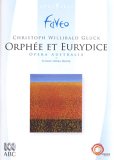 Orphee Et Eurydice | DVD | (03/04/2006)
from £16.18
| Saving you £-1.19 (N/A%)
| RRP
Orphee Et Eurydice | DVD | (03/04/2006)
from £16.18
| Saving you £-1.19 (N/A%)
| RRP Gluck: Orphee Et Eurydice (Guidarini)
![Paisiello: Nina [2002]](/pictures/1028334.jpg) Paisiello: Nina | DVD | (19/05/2003)
from £33.21
| Saving you £-8.22 (N/A%)
| RRP
Paisiello: Nina | DVD | (19/05/2003)
from £33.21
| Saving you £-8.22 (N/A%)
| RRP Live recording of Giovanni Paisiello's opera 'Nina' which follows the tale of a woman traumatised by the death her lover Lindoro.
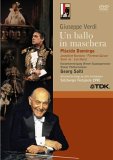 Verdi - Un Ballo In Maschera - Verdi | DVD | (01/04/2005)
from £N/A
| Saving you £N/A (N/A%)
| RRP
Verdi - Un Ballo In Maschera - Verdi | DVD | (01/04/2005)
from £N/A
| Saving you £N/A (N/A%)
| RRP John Schlesinger directs Placido Domingo in Verdi's opera...
 Puccini: Tosca -- 1976 film version | DVD | (15/10/2001)
from £N/A
| Saving you £N/A (N/A%)
| RRP
Puccini: Tosca -- 1976 film version | DVD | (15/10/2001)
from £N/A
| Saving you £N/A (N/A%)
| RRP Opera is an inherently theatrical medium that does not lend itself readily to the realism of film treatment. The shining exception is Puccini's Tosca, an action-packed melodrama that unfolds in three taut and gripping acts, like the meatiest of Hollywood films noir. And unlike most operas, these three acts are set in three very specific Roman locales. Thus this 1976 film takes place in the church of Sant'Andrea della Valle (Act 1), the Palazzo Farnese (Act 2) and the Castel Sant'Angelo (Act 3). The evocative settings, however, would be mere window-dressing if the cast wasn't just right; fortunately here Placido Domingo is at his virile peak in the heroic tenor role of Cavaradossi; Raina Kabaivanska is a sultry, vocally beautiful Tosca; while a more infamous and domineering Scarpia than that of Sherrill Milnes can hardly be imagined. Bruno Bartoletti and the New Philharmonia Orchestra give lustily dramatic support. Here the music and vocals are pre-recorded and the singers mime to the playback. Occasionally the result is a little unnatural, but overall the cast are good enough actors to bring off the conceit even in the close-ups. It all pays off triumphantly with the gripping realism of the rooftop finale, the one place where film can improve on stage. With the authenticity of the settings assured and such distinguished leads singing so well, this is an almost ideal filmed Tosca. On the DVD: Tosca on disc is presented in 4:3 ratio with a choice of Dolby 5.1 or LPCM Stereo. The picture is adequate but a little flat (possibly because the format is NTSC not PAL) and the same can be said for the sound, which does what it should but is never revelatory. Subtitles are provided in the main European languages and Chinese. --Mark Walker
![Offenbach: La Vie Parisienne [1991]](/pictures/1028566.jpg) Offenbach: La Vie Parisienne | DVD | (14/02/2002)
from £25.21
| Saving you £4.78 (18.96%)
| RRP
Offenbach: La Vie Parisienne | DVD | (14/02/2002)
from £25.21
| Saving you £4.78 (18.96%)
| RRP Offenbach's 1867 La Vie Parisienne is perhaps the quintessential French comic operetta: a broad satire on Paris society set against the backdrop of the 1867 Exposition and the descent of easily lampooned foreigners on to the city; sharp moments that Molière would be proud of; undercurrents of quick-fire farce, confusion, lust and mistaken identity; and a rich cast of characters racing inexorably to a can-can finale. This 1991 production by the Lyon National Opera presents a welcome opportunity to revel in a uniquely Gallic confection rarely seen outside France. It's also a chance to enjoy one of Offenbach's most inventive, melodic scores in which the starring musical role and many of the best tunes go to the orchestra, here conducted by Jean-Yves Ossonce. This is no accident: the operetta was originally created for a company of actors who relied on pastiche and the composer's help to get them through their "numbers". Not so these singers, of course. As Metella, the languorous courtesan who is responsible for the unravelling debacle, Helene Delavault is in meltingly good voice for her show-stopping rondeau, "A minuit sonnant commence la fete". Her sparring suitors Gardefeu (Jean-Francois Sivadier) and, particularly, Bobinet (Jacques Verzier) combine marvellous visual comedy with fluid singing and there is some dazzling vocal work from the supporting cast. It's a long piece, but hugely enjoyable. On the DVD: La Vie Parisienne has the usual, excellent booklet notes of ArtHaus DVD releases, which go some way to compensate for a disappointing lack of extras. Time, surely, to introduce some on-screen history or cross-references to other relevant works. The picture quality is good and sharp, although the 4:3 format does little justice to Carlo Tommasi's sweeping, stylish sets. The PCM Stereo soundtrack provides an adequate orchestral experience while managing to muffle much of the spoken dialogue. --Piers Ford
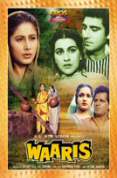 Waaris | DVD | (15/03/2004)
from £N/A
| Saving you £N/A (N/A%)
| RRP
Waaris | DVD | (15/03/2004)
from £N/A
| Saving you £N/A (N/A%)
| RRP Dulla and Gajjan are two brothers but their father engaged by Dulla's wayward ways names Gajjan's son Sarwan as his sole heir. A furious Dulla slays his father for which he is imprisoned. Meanwhile Gajjan's only son Sarwan grows up and falls in love with the virtuous Paro who has a young sprightly carefree sister Seebo who is in love with her childhood friend Binder. Dulla returns from the prison on the day Sarwan and Paro get married. He plots to get the land from his brother Gajjan by getting rid of his only heir. Immediately after the marriage through the connivance of Dulla Sarwan is fatally stabbed and killed. Dulla is now confident that he can acquire the land. Here begins Paro's struggle to acquire a rightful heir for the land and to save herself from the wicked intentions of Dulla. She spurns all his advances. Dulla tortures the family's faithful employees into leaving their master and creates every possible difficulty and hardship for Paro. She convinces her unwilling father-in-law Gajjan to marry her younger sister Seebo so the family can get a legal heir. Does she succeed in her struggle? Does the family get its heir? Watch the family drama Warris.
![Tarare - Salieri [1988]](/pictures/1027986.jpg) Tarare - Salieri | DVD | (21/01/2005)
from £N/A
| Saving you £N/A (N/A%)
| RRP
Tarare - Salieri | DVD | (21/01/2005)
from £N/A
| Saving you £N/A (N/A%)
| RRP The Salieri opera peformed at the 1988 Schwetzinger Festspiele. 'Tarare' tells the story of the Spirit Of Nature who creates new people in an attempt to cleanse the human race. The results bring love and jealousy. Sung in French.
![Mozart: Le Nozze di Figaro (The Marriage of Figaro) -- Berlin/Barenboim [2000]](/pictures/1028797.jpg) Mozart: Le Nozze di Figaro (The Marriage of Figaro) -- Berlin/Barenboim | DVD | (05/04/2000)
from £22.97
| Saving you £2.02 (8.10%)
| RRP
Mozart: Le Nozze di Figaro (The Marriage of Figaro) -- Berlin/Barenboim | DVD | (05/04/2000)
from £22.97
| Saving you £2.02 (8.10%)
| RRP A massive success from its premiere on May 3, 1786, Mozart's Le Nozze di Figaro ("The Marriage of Figaro") downplays the social satire in Beaumarchais' original tale of romantic intrigue and revenge between the classes, instead emphasising the psychological dimensions. Here in a live production from the Staatsoper, Berlin, director Alexandre Tarta employs simple sets, focusing all attention on a very fine cast as they spin-out the farcical ironies. The result is one of the most acclaimed interpretations of recent years, with soprano Dorethea Röschmann reprising her star-making 1995 Salzburg debut as the sensual and flirtatious Susanna. Rene Papé makes a fine Figaro, and there are no weak links, with not just the singing but the performances uniformly excellent. The humour on show makes the sorrow all the more genuinely affecting. Of course Mozart's music is marvellous, packed with great arias and duets, and under Daniel Barenboim the State Opera Choir Berlin "Staatskapelle Berlin" are on splendid form.On the DVD: With the opera lasting 190 minutes the only other feature on the disc is a plot synopsis. However, the subtitles can be switched on or off. The booklet also provides a synopsis, together with some background on the opera and the performers. Filming a live production with theatre lights is never going to result in the most detailed images, and under these circumstances the anamorphically enhanced picture fares well, being far superior to VHS. The Dolby Digital 5.1 sound is realistic, detailed and absorbing without ever being unnecessarily showy. --Gary S. Dalkin
![Carmen - Glyndebourne Festival Opera [1985]](/pictures/1045504.jpg) Carmen - Glyndebourne Festival Opera | DVD | (24/10/2005)
from £24.28
| Saving you £-6.29 (-35.00%)
| RRP
Carmen - Glyndebourne Festival Opera | DVD | (24/10/2005)
from £24.28
| Saving you £-6.29 (-35.00%)
| RRP Bernard Haitink conducts Maria Ewing and Barry McCauley in an interpretation of Bizet's Carmen. Maria Ewing's electric portrayal of the gypsy Carmen is one of the finest in recent memory. Her dark alluring looks and feline grace are exactly suited to playing the hot-blooded Spanish temptress who charms men with her sensuous wild spirit. Peter Hall's production filmed in 1985 reveals Bizet's opera as a torid drama of passion blood and squalor with sets by John Bury that capture the earthy warmth of Spain in an unglamorised view of the factory girls of Seville. Barry McCauley is a thrilling Don Jose Micaela is sung by Marie McLaughlin with Bernard Haitink conducting the London Philharmonic Orchestra.
![Glass: Satyagraha [1981]](/pictures/1028721.jpg) Glass: Satyagraha | DVD | (04/01/2001)
from £26.98
| Saving you £-1.99 (-8.00%)
| RRP
Glass: Satyagraha | DVD | (04/01/2001)
from £26.98
| Saving you £-1.99 (-8.00%)
| RRP Based on an original scenario by Philip Glass and Constance De Jong 'Satyagraha'. Performed in Sanskrit.Act 1. Tolstoy.Act 2. Tagore.Act 3. Martin Luther King.
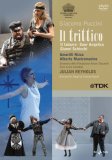 Puccini-Il Trittico | DVD | (27/08/2007)
from £N/A
| Saving you £N/A (N/A%)
| RRP
Puccini-Il Trittico | DVD | (27/08/2007)
from £N/A
| Saving you £N/A (N/A%)
| RRP Giacomo Puccini - Il Trittico:Recorded live at the Teatro Comunale di Modena, 8 February 2007.
![Verdi: Rigoletto -- Vienna/Chailly [1983]](/pictures/1033433.jpg) Verdi: Rigoletto -- Vienna/Chailly | DVD | (12/06/2006)
from £N/A
| Saving you £N/A (N/A%)
| RRP
Verdi: Rigoletto -- Vienna/Chailly | DVD | (12/06/2006)
from £N/A
| Saving you £N/A (N/A%)
| RRP 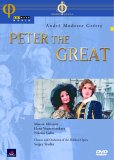 Peter The Great - Gretry | DVD | (02/05/2005)
from £N/A
| Saving you £N/A (N/A%)
| RRP
Peter The Great - Gretry | DVD | (02/05/2005)
from £N/A
| Saving you £N/A (N/A%)
| RRP From the Helikon Opera Moscow 2002....
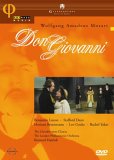 Don Giovanni - Mozart | DVD | (27/06/2005)
from £3.52
| Saving you £12.73 (563.27%)
| RRP
Don Giovanni - Mozart | DVD | (27/06/2005)
from £3.52
| Saving you £12.73 (563.27%)
| RRP Arthaus present another in the Glyndebourne classic opera series this time the long-awaited 1977 production of Don Giovanni directed by Sir Peter Hall.Don Giovanni represents a force of nature without conscience and sense of responsibility. His sole aim in life is to win the female he has just fallen in love with. Therefore all the people around him become his victims. Not able to own up to his crimes he is dragged down to hell.Sir Peter Hall has long been associated with Glyndebourne having directed there since 1970. His production of Mozart's tragic 'opera of all operas' as E.T.A. Hoffman once called it for the 1977 Glyndebourne seasons has received universal praise - a high accolade for such an original production. Celebrated baritone and Glyndebourne favourite Benjamin Luxon perfectly embodies the unconscionable seducer Don Giovanni - although he nearly didn't appear after injuring himself during rehearsals jumping from a balcony as stage directions instructed.
![Berg: Lulu - Zurich/Welser-Most [2002]](/pictures/1028246.jpg) Berg: Lulu - Zurich/Welser-Most | DVD | (05/01/2004)
from £N/A
| Saving you £N/A (N/A%)
| RRP
Berg: Lulu - Zurich/Welser-Most | DVD | (05/01/2004)
from £N/A
| Saving you £N/A (N/A%)
| RRP A performance of the Alban Berg opera in two acts plus excerpts from the Lulu Symphony music for the third act which was never completed. Franz Welser-Most conducts.
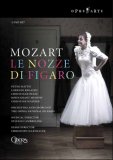 Wolfgang Amadeus Mozart - Le Nozze Di Figaro | DVD | (28/08/2006)
from £25.65
| Saving you £4.34 (16.92%)
| RRP
Wolfgang Amadeus Mozart - Le Nozze Di Figaro | DVD | (28/08/2006)
from £25.65
| Saving you £4.34 (16.92%)
| RRP Lorenzo Da Ponte's libretto and Mozart's music were to transform the stock characters of the Opera Buffa tradition into real human beings, making Le Nozze di Figaro one of the most sophisticated operas of all time. A charming expressive and witty Figaro, Lorenzo Regazzo leads a sparkling cast to illustrate superbly the timeless humanity of this masterpiece.Christoph Marthaler's take on Mozart's classic is both daringly original and highly contemporary, the setting transposed to a wedding-dress shop lit with neon lights and a shabby register office.
 Wagner-Der Ring Des Nibelunge | DVD | (02/07/2007)
from £80.98
| Saving you £-20.99 (N/A%)
| RRP
Wagner-Der Ring Des Nibelunge | DVD | (02/07/2007)
from £80.98
| Saving you £-20.99 (N/A%)
| RRP This legendary Bayreuth Festival production of Wagner's Der Ring des Nibelungen directed by Harry Kupfer with designs by Hans Schavernoch and conducted by Daniel Barenboim is considered perhaps the finest video recording of these four operas ever made. For their innovative modernist staging Kupfer and his team turned away from the work's time of origin and located The Ring at a road of history a meeting-place of past present and future which sets the scene for the story's struggles of power and love. Barenboim's authoritative yet highly responsive reading of the immense score and the extraordinary performances of the cast help to make this a truly memorable Ring.
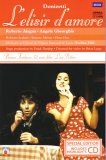 L'Elisir D'Amore - Donizetti | DVD | (13/06/2005)
from £N/A
| Saving you £N/A (N/A%)
| RRP
L'Elisir D'Amore - Donizetti | DVD | (13/06/2005)
from £N/A
| Saving you £N/A (N/A%)
| RRP It's hard to think of a couple better suited to play the romantic leads in Donizetti's comedy L'Elisir d'amore than husband-and-wife team Roberto Alagna and Angela Gheorghiu. Both are charming on stage, and both have voices to die for: Gheorghiu's dark liquid tones are particularly spine-tingling, and her coloratura abilities awe-inspiring, and though Alagna has mainly concentrated on the more spinto (powerful) roles of the tenor repertoire, in 1996 when this live production was recorded his voice was just a little fresher and lighter and thus perfect for the bel canto gracefulness of Donizetti's writing. His performance of "Una furtiva lagrima", for example, is meltingly sung and free from all temptation to overplay the high notes. Frank Dunlop's 1920s-set production doesn't quite produce the belly laughs some stagings manage (in Dulcamara's patter song, for example), but has a certain small-town wistful charm nonetheless. The orchestral accompaniment under Donizetti expert Evelino Pidò is spot on, and never falls into the banal "oom-pah" trap that such simple writing can often lead to. Overall, it's a production of great charm. On the DVD: L'Elisir d'amore comes to disc with a 52-minute film on the history of the opera and its recording, with contributions from Alagna and Gheorghiu, and subtitles in English, French, German, Spanish and Chinese. The Lyon opera house is particularly well set up for video recording, and Brian Large does a sophisticated job of capturing a live performance: it's hard to believe at some points that the cameras aren't actually on stage in the middle of the action. Just occasionally this leads to the singers not knowing where to look and seeming a trifle lost, but generally the performances work superbly well on the small screen. --Warwick Thomson

Please wait. Loading...
This site uses cookies.
More details in our privacy policy